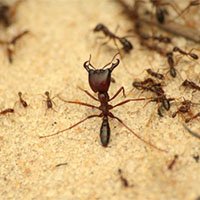
How to Get Rid of Ants: A Comprehensive Guide
Ants are one of the most common household pests, often invading homes in search of food, water, and shelter. While they may seem harmless, certain species can cause significant damage to property and compromise food safety. If you’re struggling with an ant infestation, this guide will help you understand how to effectively eliminate these pesky invaders and prevent them from returning.
Understanding Ant Behavior
To effectively get rid of ants, it’s crucial to understand their behavior and the types of ants that may invade your home. Ants are social insects that live in colonies, which can range from a few dozen to millions of individuals. They communicate through pheromones, leaving scent trails that other ants follow to food sources.
Common types of ants that invade homes include:
- Carpenter Ants: These ants can cause structural damage as they tunnel into wood to build their nests.
- Sugar Ants: Attracted to sweet foods and beverages, they are often found in kitchens and pantries.
- Fire Ants: Known for their painful stings, they build mounds in lawns and gardens and can invade homes.
- Pavement Ants: Typically found in cracks in driveways and sidewalks, these ants are also attracted to food sources inside homes.
Steps to Get Rid of Ants
- Identify the Source: Before taking action, locate where the ants are entering your home and where their nest might be. Observing their trails can help you determine their entry points.
- Seal Entry Points: Close off potential entry points by sealing cracks, gaps, and holes in walls, windows, and doors. Use caulk or weather stripping to block these pathways.
- Remove Food Sources: Ants are attracted to food, so keep your kitchen and dining areas clean.
- Store food in airtight containers.
- Clean up spills and crumbs promptly.
- Keep pet food stored and off the floor.
- Take out the trash regularly and use sealed bins.
- Use Ant Baits: Ant baits are an effective method for killing ants. These baits contain poison that worker ants carry back to their colony, effectively eliminating the queen and the rest of the colony. Place baits near ant trails and entry points.
- Natural Remedies: If you prefer a more natural approach, several home remedies can help deter ants:
- Vinegar: A mixture of equal parts vinegar and water can be sprayed in areas where ants are seen. The strong smell disrupts their scent trails.
- Diatomaceous Earth: This natural powder can be sprinkled in areas where ants travel. It dehydrates and kills ants that come into contact with it.
- Essential Oils: Scents like peppermint, tea tree oil, and lemon oil can repel ants. Mix a few drops with water and spray around entry points.
- Professional Pest Control: If the infestation persists despite your efforts, consider hiring a professional pest control service. They have access to more potent treatments and can provide long-term solutions.
Preventing Future Infestations
Once you’ve successfully eliminated the ants, taking steps to prevent their return is crucial. Here are some preventative measures:
- Maintain Cleanliness: Continue regular cleaning practices to keep food and spills at bay.
- Regular Inspections: Periodically check for signs of ants or their nests, especially in the warmer months when they are most active.
- Landscape Maintenance: Trim shrubs and trees that touch your home, as they can provide pathways for ants.
- Moisture Control: Fix leaky pipes and ensure proper drainage to prevent attracting ants looking for water.
Conclusion
Getting rid of ants requires a combination of identifying the source, eliminating food sources, and using effective treatment methods. By following the steps outlined in this guide, you can reclaim your home from these unwelcome pests and prevent future infestations. Whether you opt for DIY solutions or professional pest control services, addressing the issue promptly will help keep your home ant-free.